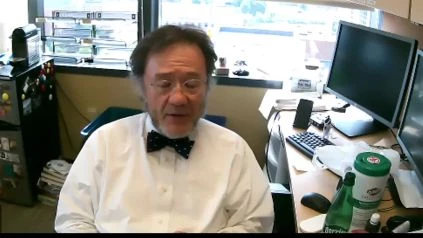Philip McCarthy, MD of Roswell Park discusses New Strategy for Controlling Graft vs. Host Disease in Blood/Marrow Transplant Recipients.
New preclinical work by a team of researchers from the Transplant and Cellular Therapy Program of the Roswell Park Comprehensive Cancer Center suggests that the risk of developing acute graft vs. host disease (GVHD) during allogeneic blood / marrow transplant (BMT), a potentially curative treatment for selected patients with hematologic disorders, can be minimized using an existing class of medications named
Hemn Mohammadpour PhD, DVM, Philip McCarthy, MD, Elizabeth Repasky, PhD, and colleagues show in a new study in the journal JCI Insight that beta adrenergic receptor (BAR) signaling can be regulated to calm the new donor immune system ‘s propensity to cause GVHD in allogeneic BMT recipients (alloBMT) while still allowing transplanted donor immune cells to fight the recipient’s immune system
Acute GVHD — one of the most common and important toxicity that can occur after alloBMT — is a reaction to the immune system in which donor T cells invade healthy cells in their new host, frequently targeting skin, gastrointestinal tract and liver. This life-threatening condition will occur in up to 60 per cent of patients suffering from alloBMT, a common leukemia, lymphoma, and other hematological disorders. AlloBMT, or another person’s blood or marrow cell transplant, causes a graft vs. tumor (GVT) effect where the donor cells will target cancer of the host, possibly resulting in cure.
The research team found that BAR signaling is a key modulator of acute GVHD but does not affect the GVT effect negatively. In the new research, BAR signaling helps to control how the host responds to treatment, allowing the new donor immune system to identify and remove cancer without destroying normal host tissues excessively.
Preclinical studies by the team show another main finding: that beta-adrenergic stimulation with a beta-2 agonist like bambuterol (brand name Bambec) can reduce the magnitude of acute GVHD without sacrificing the GVT effect. These medications, referred to as bronchodilators, are frequently used to open airway passages for people with asthma, and can also reduce the severity of an allergic reaction.
If verified by additional research, these results will represent a major advance, as current methods for preventing or treating acute GVHD are not always fully successful or may hamper GVT — the expected beneficial effect of a donor’s transplanted immune cells.
In this study, another type of GVHD called chronic GVHD, which happens late after alloBMT, was not analyzed.
Previous preclinical studies by another Roswell Park research team found that the recipients have elevated levels of catecholamine when transplants are done at room temperature, dampening the magnitude of the acute GVHD. Transplants performed at higher temperatures (83 ° F) were associated with higher acute GVHD incidence and severity along with lower levels of catecholamine.
The earlier study showed that in a preclinical model, beta-2 agonists such as bambuterol have similar effects to catecholamines and mimic the results of temperature regulation. The ambient temperature can thus affect the incidence and severity of GVHD.
The current research is also building on earlier work by Dr. Mohammadpour, a research fellow at the Department of Immunology, under the direction of Dr. Repasky. The team identified the immunological mechanisms by which chronic stress increases the number of myeloid-derived suppressor cells in the blood and tumors of patients, sparks more aggressive tumor development, and proposed modulating BAR signaling as an effective strategy to reduce the response and allow better functioning of cancer treatments.
This project was funded by grants from several National Institutes of Health ( NIH) agencies (project no. R01CA205246, R01CA236390, R37AI34495, R01HL118979, R01HL56067, F32CA239356 and P30CA016056), and by donations to Roswell Park, including a gift from Brendan and Elise McCarthy.

